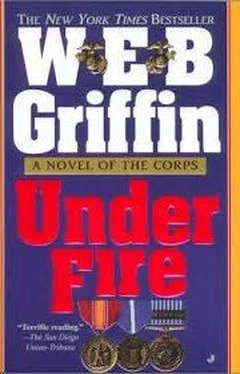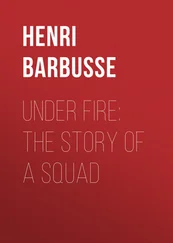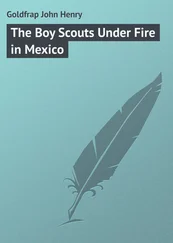Griffin W.E.B. - The Corps 09 - Under Fire
Здесь есть возможность читать онлайн «Griffin W.E.B. - The Corps 09 - Under Fire» весь текст электронной книги совершенно бесплатно (целиком полную версию без сокращений). В некоторых случаях можно слушать аудио, скачать через торрент в формате fb2 и присутствует краткое содержание. Год выпуска: 0101, Жанр: Старинная литература, на английском языке. Описание произведения, (предисловие) а так же отзывы посетителей доступны на портале библиотеки ЛибКат.
- Название:The Corps 09 - Under Fire
- Автор:
- Жанр:
- Год:0101
- ISBN:нет данных
- Рейтинг книги:5 / 5. Голосов: 1
-
Избранное:Добавить в избранное
- Отзывы:
-
Ваша оценка:
- 100
- 1
- 2
- 3
- 4
- 5
The Corps 09 - Under Fire: краткое содержание, описание и аннотация
Предлагаем к чтению аннотацию, описание, краткое содержание или предисловие (зависит от того, что написал сам автор книги «The Corps 09 - Under Fire»). Если вы не нашли необходимую информацию о книге — напишите в комментариях, мы постараемся отыскать её.
The Corps 09 - Under Fire — читать онлайн бесплатно полную книгу (весь текст) целиком
Ниже представлен текст книги, разбитый по страницам. Система сохранения места последней прочитанной страницы, позволяет с удобством читать онлайн бесплатно книгу «The Corps 09 - Under Fire», без необходимости каждый раз заново искать на чём Вы остановились. Поставьте закладку, и сможете в любой момент перейти на страницу, на которой закончили чтение.
Интервал:
Закладка:
As it turned out, he had been a captain five months be-fore he had to use the.45, and by then, of course, it was his business what he carried.
He put all of his civilian clothing on hangers and hung them, and the shoulder holster, in the left locker, then took a fresh Marine Corps khaki uniform from the dry cleaner's bag. He laid the shirt on his desk and pinned the insignia on carefully. His ribbons included the Bronze Star medal with V-device, and a cluster, indicating he had been deco-rated twice. He also had the Purple Heart medal, which signified he had been wounded. And he had, souvenirs of Parris Island, silver medals indicating he had shot Expert with the M-l Garand Rifle, the U.S. Carbine Caliber.30, the M-1911A1 pistol, the Browning Automatic Rifle, and the Thompson machine gun.
He put on the fresh uniform and examined himself in the mirror mounted on the door of the left locker.
He looked, he thought, like a squared-away Marine cap-tain, who had seen his share of war, and was perfectly qualified to be what he was, commanding officer of B Company, 55th Marines, USMC Reserve.
That was pretty far from the truth, he thought. Baker Company was an infantry company. Every Marine in Baker Company, from the newest seventeen-year-olds who had not even yet gone through boot camp at Parris Island through the non-coms, most of whom were really good Marines, many combat tested, to the other four officers, two of whom had seen combat, was absolutely delighted that the old man, the skipper, the company commander was a World War II veteran tested-and wounded, and deco-rated for valor-in combat.
The problem with that was that he wasn't an experienced, combat-tested, infantry officer. The first-and only-in-fantry unit in which he had ever served was Company B, 55th Marines, USMC Reserve. The only Table of Organization (TOandE) unit in which Captain Hart had ever served was USMC Special Detachment 16.
USMC Special Detachment 16 had been formed with the mission of supporting the Australian Coastwatchers, men left behind when the Japanese occupied islands in the Solomons, who at great risk to their lives had kept tabs on Japanese units and movements. He had been assigned to Detachment 16 because command of it had been given to Brigadier General Fleming Pickering, and then Sergeant Hart had been Pickering's bodyguard.
He'd won the Bronze Star and the Purple Heart fair and square with Detachment 16, going ashore on Japanese-held Buka Island, but that had been his last combat. Immediately after returning from Buka, he had been given a commission as a second lieutenant-not because he had done anything outstanding as a sergeant, but because his being an officer was more convenient for General Pickering.
The convenience had nothing to do with General Picker-ing's personal comfort, but rather with giving Hart access to one of the two most closely held secrets of World War II, MAGIC-the other was the development of the atomic bomb. Cryptographers in the United States and Hawaii had cracked many-by no means all-of the codes of the Im-perial Japanese Army and Navy. Second Lieutenant Hart's name had appeared on a one-page typewritten list of those who held a MAGIC clearance.
The list was headed by the name of President Franklin Delano Roosevelt, followed by those of General Douglas MacArthur and Admiral Chester W. Nimitz, and worked its way down through the ranks past Brigadier General Pick-ering-who reported directly to Roosevelt-to those of the junior officers who had broken the code, and those-like Hart-who handled the actual decryption of MAGIC mes-sages in Washington, Hawaii, and Brisbane.
Generals and admirals did not themselves sit down at the MAGIC machines and punch its typewriter-like keys. Second Lieutenant Hart, and a dozen others like him, did.
And, in a very real sense, Hart's MAGIC clearance had been his passport out of the fighting war. No one with a MAGIC clearance could be placed in any risk at all of being captured.
And then, in early February 1943, President Roosevelt had named General Pickering OSS Deputy Director for the Pacific. All of the members of USMC Special Detachment 16 had been "detached from USMC to duty with the Office of Strategic Services (OSS), effective 8 August 1943" and that remark had been entered into the service-record jack-ets.
That remark was still in Captain Hart's service records, and he knew that both his first sergeant and the gunnery sergeant had taken a look at his records, and suspected his officers had, too. In their shoes, he would have taken a look.
There were other remarks entered sequentially in his jacket, after the "detached to OSS" entry, that he knew his men had seen:
5 May 1944 Promoted Captain
4 October 1945 Relieved of Detachment to OSS
4 October 1945 Detached to USMC Inactive Reserve
18 April 1946 Detached to USMC Organized Reserve
18 April 1946 Attached Company B, 55th Marines,
USMC Reserve, St. Louis, Mo., as Commanding Officer
Hart knew that his service records jacket, combined with everyone's knowledge that he was the Chief of the St. Louis Homicide Bureau, painted a picture of George Hart that was far more glamorous than the facts: a decorated, wounded Marine who had been an OSS agent in the War had come home to the police force, and for patriotic rea-sons had joined the active reserve.
There had been questions, of course, about his wartime service, which he had declined to answer.
How could he have answered them?
I wasn't really an OSS agent, fellas. What I was was a bodyguard to a general who had a MAGIC clearance.
What's MAGIC?
He could not have answered that question. In 1946, any-thing connected to MAGIC was classified; as far as he knew, it still was.
It was far easier to say what he had said.
"I'd rather not talk about that, you understand."
They understood. They had all seen the movies about the OSS. OSS agents didn't talk about the OSS.
Until now, it hadn't made any difference. He had joined the Marine Corps Organized Reserve because the recruiter who had made the pitch had pointed out that he would draw a day's pay and allowances for one four-hour training session a week, plus two weeks in the summer, which wasn't bad money, especially since he had acquired a wife and ultimately three children to support on a police lieu-tenant's pay.
And if he put in a total of twenty years combined active duty and reserve service, there would be a pension when he turned sixty, something to consider, since police pensions were anything but generous.
On assuming command of Baker Company, he had had virtually no idea what a company commander was sup-posed to do, or how to do it. But he'd inherited a first ser-geant who did have an idea, and who initially led him by the hand through the intricacies of commanding a com-pany.
And he had taken correspondence courses in all kinds of military subjects from the Marine Corps Institute. And he asked questions of the regular Marine Corps officer as-signed as instructor/inspector at the Navy/Marine Corps Reserve Training Center.
The IandI was an Annapolis graduate, but he had never been in a war, and he treated Captain Hart, who had, with respect and a presumption of knowledge on Captain Hart's part that Hart knew he really didn't deserve.
But with a lot of hard work, the IandI and Hart had turned Baker Company into a first-class reserve infantry com-pany, at 94 percent of authorized strength, with everybody but the kids-yet-to-go-to-boot-camp trained in their spe-cialty.
Which was not, Hart realized, the same thing as saying Baker Company was prepared to go to war under the com-mand of Captain George S. Hart. It looked like that was going to happen.
Hart had just finished tucking his shirt into his trousers, and making sure the shirt placket was precisely aligned with his belt and fly, when there was a discreet knock on the glass pane of his door.
Читать дальшеИнтервал:
Закладка:
Похожие книги на «The Corps 09 - Under Fire»
Представляем Вашему вниманию похожие книги на «The Corps 09 - Under Fire» списком для выбора. Мы отобрали схожую по названию и смыслу литературу в надежде предоставить читателям больше вариантов отыскать новые, интересные, ещё непрочитанные произведения.
Обсуждение, отзывы о книге «The Corps 09 - Under Fire» и просто собственные мнения читателей. Оставьте ваши комментарии, напишите, что Вы думаете о произведении, его смысле или главных героях. Укажите что конкретно понравилось, а что нет, и почему Вы так считаете.










